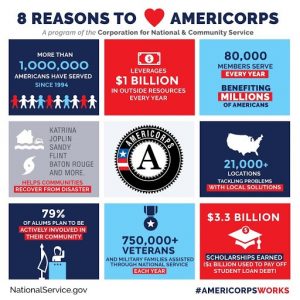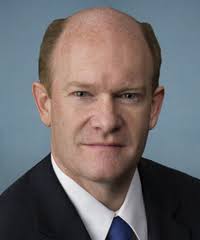By Stas Margaronis
A Senate Bill proposes funding 750,000 new jobs that could also support the track and trace of Covid-19 patients reducing thousands of additional infections and deaths from an expected second wave of Covid-19 projected for the fall.
In April, a group of U.S. Senators proposed: “The Pandemic Response and Opportunity Through National Service Act” which would fund 750,000 national service positions over a three-year response and recovery period, in part to meet the projected need for as many as 300,000 public health workers. [1]
The Senators include Senator Chris Coons (D-DE), Jack Reed (D-RI), Amy Klobuchar (D-MN), Tammy Duckworth (D-IL), Martin Heinrich (D-NM), Ed Markey (D-MA), Chris Van Hollen (D-MD), Richard Blumenthal (D-CT), and Dick Durbin (D-IL). They announced the introduction of legislation to expand national service programs as the country works to respond and recover from the COVID-19 pandemic.
Senator Chris Coons
Under the proposed bill, the number of AmeriCorps and national service positions could expand from 75,000 to 150,000 the first year and double to 300,000 in years two and three. The bill would also expand partnerships between AmeriCorps and federal health agencies and increase the AmeriCorps living allowance to ensure all Americans can step up to serve regardless of their financial circumstances.
AmeriCorps
The Corporation for National and Community Service (CNCS) is a U.S. federal government agency that engages more than five million Americans in service through AmeriCorps, Learn and Serve America, Senior Corps, and other national service initiatives. The agency’s mission is to “support the American culture of citizenship, service, and responsibility.”[2]
AmeriCorps is a network of national service programs, made up of three primary programs that each take a different approach to improving lives and fostering civic engagement. Approximately 75,000 Americans across the country participate in AmeriCorps each year. All of them tackle different community needs in different ways:
- Help communities recover from the damage caused by natural and other disasters.
- Build affordable housing units for families to increase economic opportunity for those living in poverty.
- Facilitate mentorship programs to connect students with community members who can help with academic performance and college preparation.
- Remove trash and other man-made debris from local ponds to promote environmental sustainability.
- Assist veterans and military families in filing for benefits claims, so they get access to the resources they need.[3]
Fighting Covid-19
A mobilization of national service workers can be a vital assist, right now, says Dr. Tom Frieden, former head of the Centers for Disease Control (CDC) and Prevention. He projects the United States will need 300,000 people to trace and track Covid-19 patients led by local public health specialists so as to reduce infections and deaths expected from a second wave this fall.
“The CDC should also guide what must become a giant public health effort to trace and track contacts of Covid-19 patients. In Wuhan, China, there were 1,800 contract tracing teams of five people, each led by an epidemiologist. The U.S. equivalent would number 300,000, working in the communities they live in and led by public health specialists. Recruits could include Peace Corps volunteers who were brought home when the pandemic spread, furloughed public employees, phone bank staff (since so much tracing work is done by phone), workers from health organizations, social service and nonprofit agencies, and recent graduates. Community and religious organizations, Meals-on-Wheels programs, businesses and others are well placed to provide services for cases and contacts who must remain in isolation or quarantine.
If this sounds like assembling an army, it is. Dr. Robert Redfield, the CDC’s director, notes that the agency has begun this work, an encouraging sign. But the agency will need to accelerate its effort to establish the protocols, structure and supervision of this army and begin training the recruits now.”[4]
The Senate bill is supported by AnnMaura Connolly, president of Voices for National Service: “National service has been an essential source of people power and ingenuity for our country at moments of great need – and AmeriCorps and Senior Corps members are once again stepping forward to serve where they are needed most during this pandemic… AmeriCorps members are integral to the COVID-19 response, serving at drive-thru testing sites, providing child care for health care workers, helping deliver food to our most vulnerable, supporting students struggling with distance learning and more. As we face the triple threat of a health, economic, and educational crisis, we should expand AmeriCorps so that every American is asked and given the opportunity serve to help our communities respond and recover. Our country needs their service now, perhaps more than ever. Voices for National Service is grateful to Senator Coons and his colleagues for their bold vision for expanding AmeriCorps as a transformational force for our country at this critical time.”[5]
In a press release, Voices for National Service noted that the March stimulus bill, the Coronavirus Aid, Relief, and Economic Security (CARES) Act, alleviated some of the negative impact to AmeriCorps and non-profits from Covid-19: “The COVID-19 pandemic is having an enormous impact on the charitable sector, as it is on the rest of the U.S. economy. Nonprofit organizations that rely on AmeriCorps and Senior Corps to provide relief to the communities they serve – including City Year, FoodCorps, Habitat for Humanity, Teach For America, United Way and countless others – have received some critically needed support in the latest economic stabilization and stimulus bill, passed by the Senate and House of Representatives”[6]
Putting Young Americans To Work
The New York Times columnist David Brooks has also hailed the Senate bill:
“The obvious imperative right now is to join workers with the work. It’s to expand national service programs to meet the urgencies of this moment…
There’s a good bill winding its way through the Senate to do precisely that, led by Chris Coons, a Democrat from Delaware. Coons was born to service and came to maturity doing service. His dad grew up in Boston and said that he never really understood the fullness and meaning of America until he commanded troops from all over the country in the Army in the 1950s.
As a young man, Coons launched one of the first AmeriCorps programs, leading 150 members in 15 cities who tutored students in inner-city schools. Later, he created another AmeriCorps program with a local volunteer fire department in Delaware. “It was the most inspiring thing I’ve ever been a part of,” Coons told me.”[7]
Brooks goes on to say:
“There is now a vast army of young people ready and yearning to serve their country. There are college graduates emerging into a workplace that has few jobs for them. There are more high school graduates who suddenly can’t afford college. There are college students who don’t want to return to a college experience. This is a passionate, idealistic generation that sees the emergency, wants to serve those around them and groans to live up to this moment.
Suddenly there is a wealth of work for them to do: contact tracing, sanitizing public places, bringing food to the hungry, supporting the elderly, taking temperatures at public gathering spots, supporting local government agencies, tutoring elementary school students so they can make up for lost time …”[8]
National Commission On Military, National and Public Service
In March, AnnMaura Connolly, president of Voices for National Service, endorsed the “Final Report of the National Commission on Military, National, and Public Service” which was published in March and details a new military and national service initiative that complements the Senate bill goals:
“It is exciting to see the bold recommendations on national service set forth in the final report of the National Commission on Military, National and Public Service. Together the national service recommendations, if enacted, would lead to a new era in American life, where every American would be asked and given the opportunity to serve. We are particularly grateful for the focus on dramatically expanding and lifting up AmeriCorps and Senior Corps to allow more people to serve through these high impact, popular and cost-effective programs. In addition, we agree that Americans who participate in AmeriCorps and Senior Corps should earn benefits that appropriately honor their service and sacrifice.”[9]
AnnMaura Connolly
A summary of the National Commission on Military, National and Public Service findings can be found here: https://inspire2serve.gov/sites/default/files/final-report/Executive%20Summary.pdf
Provisions of the Senate Pandemic Response Bill
According to its Senate sponsors, the “Pandemic Response and Opportunity Through National Service Act” would:
* Fund 750,000 national service positions over a three-year response and recovery period, in part to meet the projected need for as many as 300,000 public health workers.
* Create a partnership between AmeriCorps and CDC inspired by FEMA Corps to provide for additional response surge capacity that could be deployed to specific areas as needed.
* Provide flexibilities for programs quickly to grow and respond to dynamic local recovery needs.
* Prioritize funding for activities directly related to our response and recovery, such as: public health services, emergency logistics, workforce and reemployment services, education support (including for adult learners), and services that combat nutrition insecurity.
* Ensure that individuals’ financial resources do not limit participation by increasing the AmeriCorps living allowance to 175 percent of the federal poverty line and tying the value of the Segal Education Award to the cost of two years of public university tuition, harmonizing the treatment of both with other programs by making them nontaxable.
* Fund new online tools for Senior Corps to safely move to a teleservice model.
* Extend priority enrollment to Peace Corps, U.S. Fulbright, and AmeriCorps participants whose service or grants were interrupted by the COVID-19 pandemic, and encourage participation by members of low-income and minority communities, those who have had contact with the juvenile justice system, and those of diverse abilities.
* Invite participation by a diverse range of Americans by launching an awareness and outreach campaign on response service opportunities and supporting the Volunteer Generation Fund.[10]
FOOTNOTES
[1] https://www.coons.senate.gov/news/press-releases/sen-coons-colleagues-introduce-legislation-to-significantly-expand-national-service-programs-to-respond-to-covid-19
[2] https://en.wikipedia.org/wiki/Corporation_for_National_and_Community_Service
[3] https://www.nationalservice.gov/programs/americorps/what-americorps
[4] https://www.nytimes.com/2020/04/12/opinion/cdc-coronavirus.html
[5] https://www.coons.senate.gov/news/press-releases/sen-coons-colleagues-introduce-legislation-to-significantly-expand-national-service-programs-to-respond-to-covid-19
[6] https://voicesforservice.org/news/latest-stimulus-bill-includes-some-essential-relief-for-americorps-and-senior-corps/
[7] https://www.nytimes.com/2020/05/07/opinion/national-service-americorps-coronavirus.html
[8] Ibid
[9] https://voicesforservice.org/news/statement-on-the-final-report-of-the-national-commission-on-military-national-and-public-service/
[10] https://www.coons.senate.gov/news/press-releases/sen-coons-colleagues-introduce-legislation-to-significantly-expand-national-service-programs-to-respond-to-covid-19



